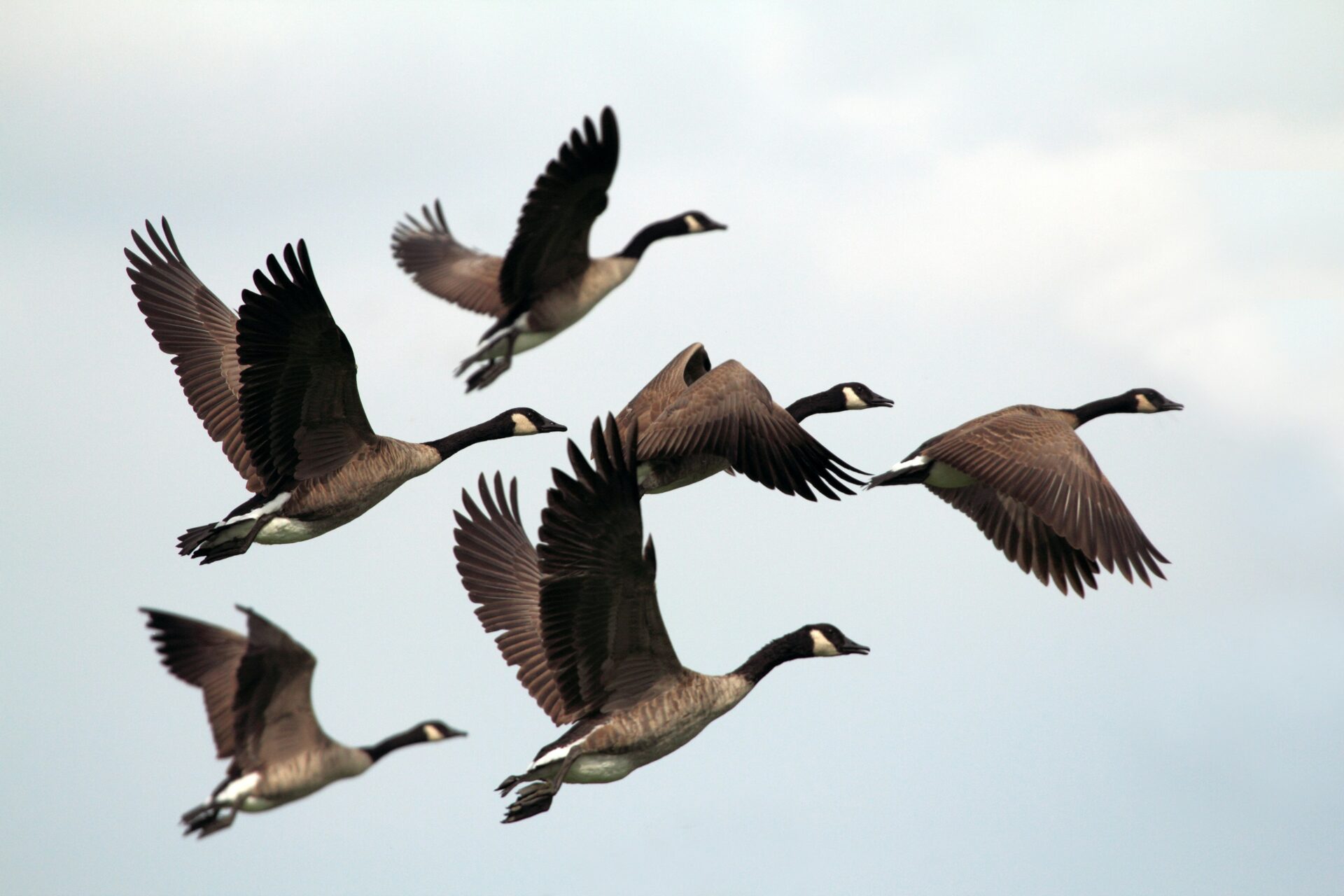
A flock of geese in flight.
Photo by Gary Bendig on Unsplash
Deep calls to deep (in the honking of your geese)
November 7, 2023
As the poet Mary Oliver famously wrote,
“The world offers itself to your imagination,
calls to you like the wild geese, harsh and exciting—,
over and over announcing your place
in the family of things.”
That language of “call” that we use when we try to describe the type of sound these migrating birds make also happens to be an important theological concept. In the Bible, we find many interesting and varied call stories. There’s Moses who objects that he’s too “slow of speech,” basically too shy, to be a prophet—one who God nevertheless calls into service. There’s the call of Elijah, who hears God’s “still small voice” in the calm after a violent storm subsides. There’s the call story of Jesus who, just as he’s emerging from his baptism in the Jordan River, feels the Holy Spirit approach him “like a dove,” and hears God affirm his life’s meaning and purpose.
So the Holy Spirit…“like a dove.” Or what if it’s more like a wild goose instead? Legend has it that the Celtic strand of Christianity has interpreted the symbol of the Holy Spirit since antiquity in their iconography and theology—God’s Holy Spirit, pictured not as peaceful and serene like a dove, but as untamed and uncontrolled (or again, “harsh and exciting”) like a wild goose (specifically, an geadh-glas, or a Greylag goose, Anser anser). One argument, perhaps, that the wild goose has over the dove as a symbol of the Holy Spirit is that, while we say the dove coos, we say the goose calls.
Watching the wild geese overhead in the “stick season” of November in northern Wisconsin, I’ve come to wonder if we might be able to say something like “Deep calls to deep in the honking of your geese?”
The ancient poet of the Psalms once described hearing God’s call through the rush and tumble of a waterfall—“Deep calls to deep in the roar of your waterfalls” (Psalm 42:7 NIV). I’ve recently come to wonder, in landscapes and seasons like “stick season” and “mud season,” if we might also be able to say something like, “Deep calls to deep in the honking of your geese?”
And so it was while out on a walk this past week—the bare branches dancing in the wind like the dancing bones of a Halloween costume, the earth and all thoughts turning towards letting go of the year’s abundance and settling in for a long winter—when suddenly I heard them. As is usual with geese (as also with God’s call to the prophets) you tend to hear them before you see them, that call which in stick season might strike a note of departure, a nostalgia to return home, and at the same time though, a call which in mud season might strike a note of homecoming and celebration, a call that in either case is piercing and rich with longing, something again, like “deep calling to deep,” or as another poet, Jane Mead, puts it:
“The geese
slicing this frozen sky know
where they are going—
and want to get there.
Their call, both strange
and familiar, calls
to the strange and familiar
heart, and the landscape
becomes the landscape
of being, which becomes
the bright silos and snowy
fields over which the nuanced
and muscular geese
are calling—while time
and the heart take measure.”
Soon enough, of course, most of the geese will be gone, departing for warmer fields, taking with them their “harsh and exciting” calls, and we’ll have to listen and watch for the quieter and sometimes softer way that the world calls to us in winter. “Departing geese,” as the Japanese haiku poet Kobayashi Issa expresses longingly, “where will you moon-gaze tomorrow?”
But then again, of course, time marches on, the seasons turn and turn back again, and when the time is right, the trees will don a new look, putting back on their best golds and greens of early spring, and the geese will return to our muddy fields like boisterous pilgrims glad to be back. “Returning geese,” Issa wrote, “up to today, such perseverance and strength!”
The longing to get away from it all, and the longing to return home, are said to be the two great themes of all the best folk music, country music, and I suppose goose music as well. The medieval Christian mystics had a Latin term for this great theme that they used to describe the structure of the universe, or creation: Exitus/Reditus—exit and return. All things, they imagined, are in the process of coming from or emanating from God, and so too all things are in the process of returning to and reuniting with God.
And so it is that in between the exit and the return, right in the middle of life’s tumult and confusion, God calls, again and again, “harsh and exciting,” “the strange and familiar calling to the strange and familiar within us,” “deep calling to deep.”
And if we have the ears to hear, it can be the sound of the most wildly beautiful assurance—that God is with us, even in the stick seasons and mud seasons of life.
Rev. Daniel Cooperrider is a writer, teacher, and pastor in the United Church of Christ (UCC). He was Pastor of the Weybridge Congregational Church (VT) and has served as Pastoral Resident at the Wellesley Village Church (MA). Daniel is the author of Speak with the Earth and It Will Teach You, and a study on the book of Job. Daniel lives on the edge of the driftless region in Madison, WI on ancestral Ho-Chunk land.
The views expressed are those of the author and not necessarily those of American Baptist Home Mission Societies.


